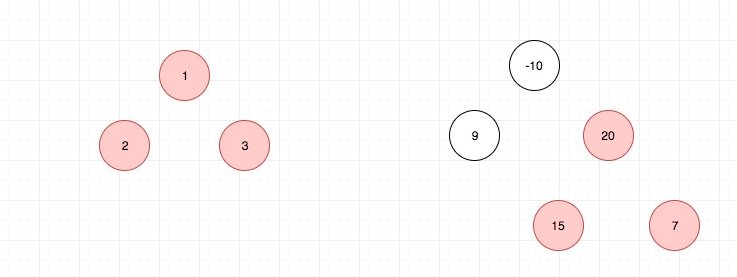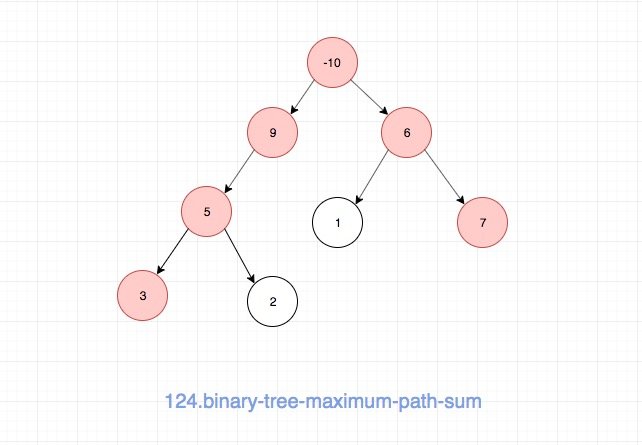https://leetcode-cn.com/problems/binary-tree-maximum-path-sum/description/
给定一个非空二叉树,返回其最大路径和。
本题中,路径被定义为一条从树中任意节点出发,沿父节点-子节点连接,达到任意节点的序列。该路径至少包含一个节点,且不一定经过根节点。
示例 1:
输入:[1,2,3]
1
/ \
2 3
输出:6
示例 2:
输入:[-10,9,20,null,null,15,7]
-10
/ \
9 20
/ \
15 7
输出:42
- 阿里
- 腾讯
- 百度
- 字节
这道题目的 path 让我误解了,然后浪费了很多时间来解这道题。我觉得 leetcode 给的 demo 太少了,不足以让我理解 path 的概念因此我这里自己画了一个图,来补充一下,帮助大家理解 path 的概念,不要像我一样理解错啦。
首先是官网给的两个例子:
接着是我自己画的一个例子:
如图红色的部分是最大路径上的节点。大家可以结合上面的 demo 来继续理解一下 path, 除非你理解了 path,否则不要往下看。
树的题目,基本都是考察递归思想的。因此我们需要思考如何去定义我们的递归函数,在这里我定义了一个递归函数,它的功能是,返回以当前节点为根节点的MaxPath
但是有两个条件:
- 根节点必须选择
- 左右子树只能选择一个
为什么要有这两个条件?
我的想法是原问题可以转化为:以每一个节点为根节点,分别求出 MaxPath,最后计算最大值,因此第一个条件需要满足.
对于第二个条件,由于递归函数子节点的返回值会被父节点使用,因此我们如果两个孩子都选择了就不符合 MaxPath 的定义了。实际上这道题,当遍历到某一个节点的时候,我们需要子节点的信息,然后同时结合自身的 val 来决定要不要选取左右子树以及选取的话要选哪一个, 因此这个过程本质上就是后序遍历
基本算法就是不断调用递归函数,然后在调用过程中不断计算和更新 MaxPath,最后在主函数中将 MaxPath 返回即可。
- 递归
- 理解题目中的 path 定义
代码支持:JavaScript,Java,Python, CPP
- JavaScript
/*
* @lc app=leetcode id=124 lang=javascript
*
* [124] Binary Tree Maximum Path Sum
*/
/**
* Definition for a binary tree node.
* function TreeNode(val) {
* this.val = val;
* this.left = this.right = null;
* }
*/
function helper(node, payload) {
if (node === null) return 0;
const l = helper(node.left, payload);
const r = helper(node.right, payload);
payload.max = Math.max(
node.val + Math.max(0, l) + Math.max(0, r),
payload.max
);
return node.val + Math.max(l, r, 0);
}
/**
* @param {TreeNode} root
* @return {number}
*/
var maxPathSum = function (root) {
if (root === null) return 0;
const payload = {
max: root.val,
};
helper(root, payload);
return payload.max;
};- Java
/**
* Definition for a binary tree node.
* public class TreeNode {
* int val;
* TreeNode left;
* TreeNode right;
* TreeNode(int x) { val = x; }
* }
*/
class Solution {
int ans;
public int maxPathSum(TreeNode root) {
ans = Integer.MIN_VALUE;
helper(root); // recursion
return ans;
}
public int helper(TreeNode root) {
if (root == null) return 0;
int leftMax = Math.max(0, helper(root.left)); // find the max sub-path sum in left sub-tree
int rightMax = Math.max(0, helper(root.right)); // find the max sub-path sum in right sub-tree
ans = Math.max(ans, leftMax+rightMax+root.val); // find the max path sum at current node
return max(leftMax, rightMax) + root.val; // according to the definition of path, the return value of current node can only be that the sum of current node value plus either left or right max path sum.
}
}- Python
class Solution:
ans = float('-inf')
def maxPathSum(self, root: TreeNode) -> int:
def helper(node):
if not node: return 0
l = helper(node.left)
r = helper(node.right)
self.ans = max(self.ans, max(l,0) + max(r, 0) + node.val)
return max(l, r, 0) + node.val
helper(root)
return self.ans- CPP
class Solution {
private:
int ans = INT_MIN;
int postOrder(TreeNode *root) {
if (!root) return INT_MIN;
int L = max(0, postOrder(root->left)), R = max(0, postOrder(root->right));
ans = max(ans, L + R + root->val);
return root->val + max(L, R);
}
public:
int maxPathSum(TreeNode* root) {
postOrder(root);
return ans;
}
};
复杂度分析
- 时间复杂度:$O(n)$,其中 n 为节点数。
- 空间复杂度:$O(h)$, 其中 h 为树高。
大家对此有何看法,欢迎给我留言,我有时间都会一一查看回答。更多算法套路可以访问我的 LeetCode 题解仓库:https://github.com/azl397985856/leetcode 。 目前已经 37K star 啦。
大家也可以关注我的公众号《力扣加加》带你啃下算法这块硬骨头。


